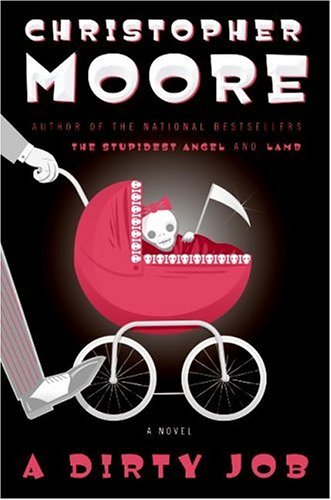Well, I mean, yeah, because he’s got titles like THE LUST LIZARD OF MELANCHOLY COVE and PRACTICAL DEMONKEEPING. These are what originally got me peeling his books up from the shelves back whenever ago. Years already, I guess. Too, though, I’ve yet to read a CMoore book that hasn’t made me smile, and then impressed me too, somehow. Like this, from A DIRTY JOB, which I just finished ten minutes ago:
- “Oh, goddamn,” said Minty Fresh (damn on the downbeat, with pain and sustain).
Which, I mean, simply just is the way people who know how to say that say it. I’d about given up ever getting it rendered right in prose, though. Italics don’t work, and hyphens just mess things all up, and if you make your character’s diction too twangy then you’ve got all other kinds of stuff to deal with. Now though, even if I can’t or at least haven’t yet got one of my characters to stress that right, at least I know there’s hope.
Too, just one page before that, there’s the single best car description I’ve ever read:
The 1957 Cadillac Eldorado Brougham was the perfect show-off of death machines. It consisted of nearly three tons of steel stamped into a massively mawed, high-tailed beast, lined with enough chrome to build a Terminator and still have parts left over — most of it in long, sharp strips that peeled off on impact and became lethal scythes to flay away pedestrian flesh. Under the four headlights it sported two chrome bumper bullets that looked like unexploded torpedoes or triple-G-cup Madonna death boobs. It had a noncallapsible steering column that would impale the driver upon any serious impact, electric windows that could pinch off a kid’s head, no seat belts, and a 325 horsepower V8 with such appalingly bad fuel efficiency that you could hear it trying to slurp liquefied dinosaurs out of the ground when it passed. It had a top speed of a hundred and ten miles an hour, mushy, bargelike suspension that could in no way stabilize the car at that speed, and undersized power brakes that wouldn’t stop it either. The fins jutting from the back were so high and sharp that the car was a lethal threat to pedestrians even when parked, and the whole package sat on tall, whitewall tires that looked, and generally handled, like oversized powdered doughnuts. Detroit couldn’t have achieved more deadly finned ostentatia if they’d covered a killer whale in rhinestones. It was a masterpiece.
That’ s more than just how the car looked, it’s that car’s personality. Which really matters, not just to A DIRTY JOB, but to fiction as a whole: cars are too often just cars, nevermind that we’re living in an age born of General Lee’s and black trans-ams and Kits &etc.
This isn’t a book review, though, don’t worry. I’ll mess around with a movie review from time to time, sure, but I’m not a good reviewer of fiction, just because I tend to skewer everything, and, until I can convince myself that that’s not just a product of jealousy, then I won’t be book reviewing (or, if I do, it’ll be dressed up like this). Not that movies don’t matter, just that I don’t make movies, so can be, I hope, a bit more objective with them. Fiction, though, it matters way too much for me to ever lie about — to ever let slide something which I think is harmful. And of course I’m just way overprotective.

Back to this non-review, though. Just as Jack Ketchum’s afterword to THE GIRL NEXT DOOR pretty much just made my day (as, having just finished the book, I swore off all horror in any form, but then the afterword let me agree to unswear it all), Moore’s acknowledgements-pages for A DIRTY JOB made me similarly happy, because of this: “…don’t ruin the story for yourself by being a stickler about the details.” I couldn’t agree with this more. Granted, it’s the job of the writer to suspend our disbelief and entertain/distract us away from all the little logical and physical impossibilities — or else just meld them into the world the story’s in — but, too, for me anyway, in spite of what McKee and five hundred other smart people and good writers say, research is exactly not where it’s at, storywise. In fact, research can just kill the hell out of a story, really. Not saying I’ve never done it, just meaning to say that, if I do it, it’s always after all the story elements have fallen into place. Only time I can really remember just digging and digging for a fact, really, was in my first novel, THE FAST RED ROAD, way towards the end where, unless I’m making this up, an engine’s topping out, and the cylinders are firing “82316457.” Or something. I just had to get that piston-order right, though, which wasn’t just super-easy. But, sure, DEMON THEORY*: the footnotes are all facts, yeah? The ones that are right, anyway (which, again thanks to Rob Bass, is most of them). Before I had help with it, though, I was kind of just using all the years there as placeholder years. I mean, until just a day or two before it rolled under that print-wheel, I had SCREAM happening in 97, when I saw it, instead of 96, when it was officially released. And SCREAM’s maybe the most important movie to DEMON THEORY.
None of which I mean to be saying — or, all of which I meant to already say below, in that Fiction vs. Non-fiction post from a few days ago.
All I really meant to say was thanks Christopher Moore, for the books. Each time, they’re a lifesaver.
And, now, off to, provided I can get my hands on them, THE ROAD and WORLD WAR Z and ONLY REVOLUTIONS and Charlie Huston’s ALREADY DEAD, though the book in front of me right now’s Ondaatje’s THE COLLECTED WORKS OF BILLY THE KID, which I’ve had recommended to me enough times that it’s feeling a lot less like serendipity, a lot more like a conspiracy of sorts. If it involves books, though, then I’ll close my eyes, step into about any convoluted plot.
©Stephen Graham Jones, 2006
* too, talking DIRTY JOB and DT, there’s a fun little thing here:
- . . . then the shot reverses to catch the attic window over his shoulder, momentarily blotted out as a black leathery something passes outside, moving simply up. Egan looks back out a moment too late . . . [from DT]
- At that moment, something large and dark passed by the second-story bedroom window, but by the time he looked up, it was gone.[from DJ]
But then, yeah, I’ve been hearing DT-echoes for seven years now. Don’t know why it should stop anytime soon . . .

 is the NYT bestselling author of 30 or so books, +350 stories, some comic books, and all this stuff here. He lives in Boulder, Colorado, and has a few broken-down old trucks, one PhD, and way too many boots. More
is the NYT bestselling author of 30 or so books, +350 stories, some comic books, and all this stuff here. He lives in Boulder, Colorado, and has a few broken-down old trucks, one PhD, and way too many boots. More
1 thought on “Death Boobs, or Why I Read Christopher Moore”
Comments are closed.